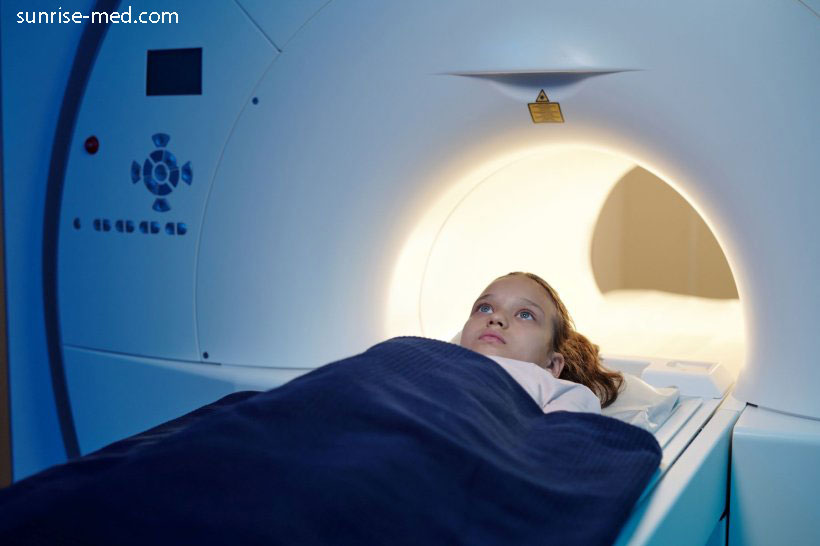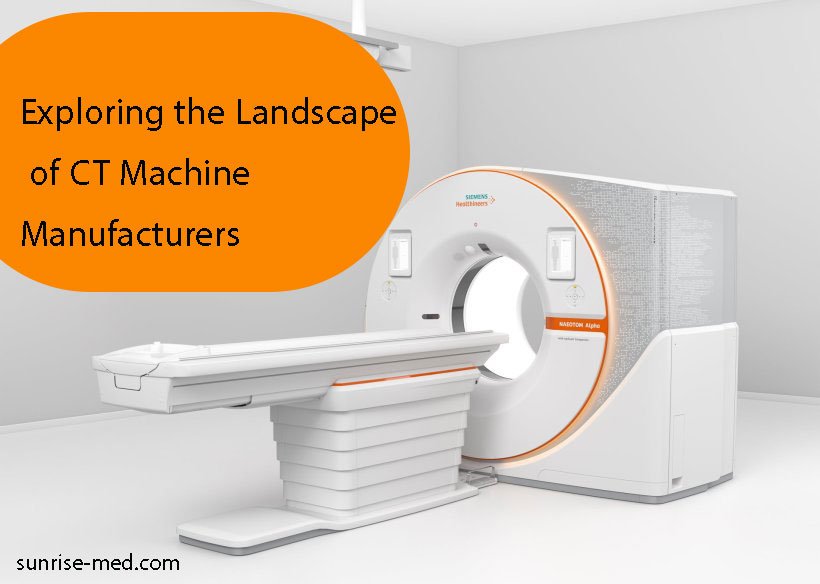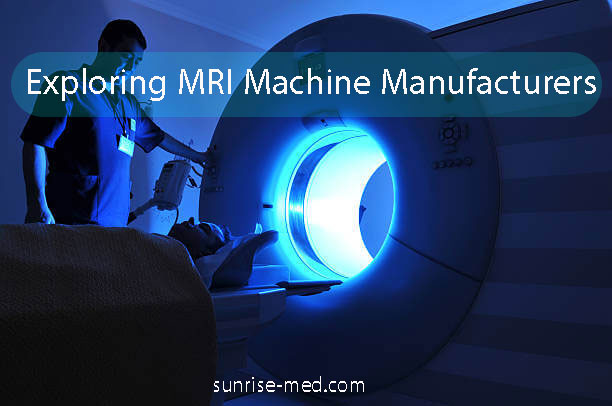Computed Tomography (CT) machines are indispensable diagnostic tools used in medical imaging for visualizing internal structures and detecting abnormalities with precision. The market for CT machines is diverse and dynamic, with several prominent manufacturers driving innovation, competition, and market growth. In this comprehensive analysis, we delve into the landscape of CT machine manufacturers, examining leading companies, their product offerings, industry dynamics, and strategic initiatives shaping the market.

1. Leading CT Machine Manufacturers
Several key players dominate the global market for CT machines, offering a wide range of products and services to healthcare providers worldwide. Some of the leading CT machine manufacturers include:
Siemens Healthineers
Siemens Healthineers is a renowned provider of medical imaging solutions, including a comprehensive portfolio of CT machines for various clinical applications. Siemens’ CT machine lineup includes the SOMATOM go. platform for routine imaging, the SOMATOM Force for dual-source CT imaging, and the SOMATOM Definition Edge for advanced cardiovascular imaging. Siemens Healthineers emphasizes innovation, performance, and clinical excellence in its CT machine offerings, catering to the diverse needs of healthcare facilities globally.
GE Healthcare
GE Healthcare is a leading supplier of medical imaging equipment, offering a diverse range of CT machines for diagnostic imaging, oncology, and interventional procedures. GE’s CT machine portfolio includes the Revolution CT platform for high-definition imaging, the Optima CT660 for routine scanning, and the Discovery CT750 HD for cardiac imaging. With a focus on technological innovation, image quality, and workflow efficiency, GE Healthcare delivers cutting-edge CT machine solutions to healthcare providers worldwide.
Philips Healthcare
Philips Healthcare is a prominent manufacturer of medical imaging devices, including a comprehensive range of CT machines for diagnostic imaging, oncology, and image-guided therapy. Philips’ CT machine portfolio includes the Ingenuity CT platform for routine imaging, the Brilliance CT 64-channel scanner for high-resolution imaging, and the IQon Spectral CT for spectral imaging capabilities. Philips Healthcare emphasizes patient-centric design, clinical versatility, and workflow optimization in its CT machine offerings, addressing the diverse needs of healthcare providers and patients.
Canon Medical Systems
Canon Medical Systems, formerly known as Toshiba Medical Systems, is a leading provider of diagnostic imaging solutions, including CT machines, MRI systems, and ultrasound equipment. Canon’s CT machine portfolio includes the Aquilion Prime SP platform for routine imaging, the Aquilion ONE / GENESIS Edition for advanced applications, and the Aquilion Precision for ultra-high-resolution imaging. Canon Medical Systems focuses on innovation, quality, and clinical utility in its CT machine offerings, enabling healthcare providers to deliver precise diagnoses and personalized treatments.
Hitachi Healthcare
Hitachi Healthcare is a key player in the medical imaging industry, offering a range of diagnostic imaging solutions, including CT machines, MRI systems, and ultrasound machines. Hitachi’s CT machine portfolio includes the Scenaria platform for routine imaging, the Supria True64 for high-resolution imaging, and the Echelon Oval for advanced cardiac imaging. With a commitment to innovation, reliability, and clinical excellence, Hitachi Healthcare delivers state-of-the-art CT machine solutions to healthcare providers worldwide.
These leading CT machine manufacturers leverage their technological expertise, industry experience, and global presence to drive innovation, expand market reach, and meet the evolving needs of healthcare providers and patients.
2. Product Offerings and Technologies
CT machine manufacturers offer a diverse range of products and technologies designed to address various clinical applications, imaging requirements, and workflow preferences. Some common product offerings and technologies found in CT machines include:
Multidetector CT (MDCT)
Multidetector CT machines feature multiple detector rows to acquire cross-sectional images of the body with high spatial resolution, fast scan times, and enhanced anatomical coverage. MDCT machines are widely used for routine diagnostic imaging, trauma assessment, and oncology staging, offering superior image quality and diagnostic accuracy.
Dual-Source CT (DSCT)
Dual-source CT machines utilize two X-ray tubes and detector arrays positioned at different angles to acquire images simultaneously, enabling rapid data acquisition, high temporal resolution, and advanced imaging capabilities. DSCT machines are ideal for cardiac imaging, coronary artery evaluation, and pediatric imaging, providing excellent image quality and motion artifact reduction.
Spectral CT
Spectral CT machines integrate dual-energy imaging techniques to acquire images at different energy levels, allowing for the simultaneous assessment of tissue composition, contrast enhancement, and material differentiation. Spectral CT machines enable spectral imaging, virtual non-contrast imaging, and material decomposition analysis, enhancing diagnostic confidence and information content in CT examinations.
Adaptive Imaging
Adaptive imaging technologies, such as iterative reconstruction algorithms and image-based gating techniques, optimize image quality, noise reduction, and dose management in CT scanning. Adaptive imaging algorithms enhance spatial resolution, contrast-to-noise ratio (CNR), and diagnostic confidence while minimizing radiation exposure and artifacts in CT images.
Advanced Applications
CT machines offer a wide range of advanced applications and imaging protocols tailored to specific clinical needs and anatomical regions. These applications include cardiac imaging, neuroimaging, musculoskeletal imaging, abdominal imaging, and oncology imaging, providing comprehensive diagnostic capabilities for healthcare providers across specialties.
Workflow Optimization
CT machine manufacturers incorporate workflow optimization features, such as automated protocols, dose tracking tools, and image reconstruction algorithms, to streamline imaging processes, improve efficiency, and enhance user experience. Workflow optimization tools facilitate protocol standardization, image consistency, and reporting efficiency, enabling healthcare providers to deliver timely and accurate diagnoses.
Artificial Intelligence (AI)
CT machine manufacturers are increasingly integrating AI-based technologies, such as machine learning algorithms, image analysis software, and decision support tools, into their products to enhance diagnostic accuracy, automate image interpretation, and assist radiologists in clinical decision-making. AI-powered solutions enable advanced image reconstruction, lesion detection, and quantitative analysis, augmenting radiologist productivity and clinical workflow efficiency.
These product offerings and technologies demonstrate the continuous innovation and advancement in CT imaging technology, empowering healthcare providers to deliver high-quality diagnostic care and improve patient outcomes.
3. Industry Dynamics and Trends
The global market for CT machines is influenced by various factors, including technological advancements, regulatory requirements, economic conditions, and healthcare trends. Several key dynamics and trends shape the CT machine market landscape:
Technological Advancements
CT machine manufacturers continue to innovate and introduce advanced technologies, such as photon counting detectors, spectral imaging capabilities, and AI-powered applications, to enhance diagnostic accuracy, image quality, and clinical utility. Technological advancements drive product differentiation, market competition, and adoption rates, fueling demand for state-of-the-art CT imaging solutions.
Regulatory Compliance
Regulatory agencies, such as the Food and Drug Administration (FDA), European Medicines Agency (EMA), and International Electrotechnical Commission (IEC), impose strict guidelines and standards governing the design, manufacturing, and performance of CT machines. Compliance with regulatory requirements, including safety standards, radiation dose limits, and quality assurance protocols, is essential for CT machine manufacturers to ensure product safety, efficacy, and market approval.
Economic Factors
Economic conditions, budget constraints, and reimbursement policies impact the purchasing decisions and investment priorities of healthcare providers when acquiring CT machines. Cost considerations, total cost of ownership (TCO), and return on investment (ROI) influence the selection of CT machine manufacturers, product configurations, and financing options, shaping market demand and pricing dynamics.
Healthcare Trends
Evolving healthcare trends, such as value-based care, population health management, and patient-centered care, drive the adoption of CT machines with enhanced clinical capabilities, workflow efficiency, and patient outcomes. Healthcare providers prioritize solutions that improve diagnostic accuracy, reduce radiation dose, and optimize resource utilization, aligning with value-driven healthcare delivery models and patient-centric care paradigms.
Market Competition
Intense competition among CT machine manufacturers, including established players and emerging entrants, fuels innovation, product differentiation, and market expansion. CT machine manufacturers compete on factors such as product performance, price competitiveness, service quality, and customer support, driving continuous improvement and technological innovation in the industry.
Globalization and Market Expansion
CT machine manufacturers expand their global footprint through strategic partnerships, acquisitions, and market expansion initiatives to capitalize on emerging opportunities in developing regions, emerging markets, and underserved communities. Globalization enables CT machine manufacturers to penetrate new markets, diversify revenue streams, and address unmet healthcare needs, driving market growth and industry consolidation.
These industry dynamics and trends underscore the dynamic nature of the CT machine market, presenting opportunities and challenges for manufacturers to innovate, differentiate, and succeed in a competitive landscape.
4. Strategic Initiatives and Partnerships
CT machine manufacturers engage in various strategic initiatives, collaborations, and partnerships to strengthen their market position, expand their product portfolio, and drive growth. Some common strategic initiatives undertaken by CT machine manufacturers include:
Research and Development (R&D)
CT machine manufacturers invest in R&D activities to develop innovative technologies, enhance product performance, and address unmet clinical needs. R&D efforts focus on improving image quality, dose optimization, workflow efficiency, and diagnostic capabilities, driving product differentiation and market competitiveness.
Product Portfolio Expansion
CT machine manufacturers expand their product portfolio through new product launches, product enhancements, and technology upgrades to meet evolving customer requirements and market demand. Portfolio expansion initiatives include the introduction of new machine models, software upgrades, and accessory options tailored to specific clinical applications and customer segments.
Market Segmentation
CT machine manufacturers adopt market segmentation strategies to target specific customer segments, clinical specialties, and geographic regions with tailored product offerings and marketing initiatives. Market segmentation enables manufacturers to better understand customer needs, preferences, and buying behavior, optimizing resource allocation and marketing effectiveness.
Strategic Alliances
CT machine manufacturers form strategic alliances, partnerships, and collaborations with healthcare providers, research institutions, and technology companies to co-develop innovative solutions, validate technologies, and accelerate market adoption. Strategic alliances facilitate knowledge exchange, technology transfer, and joint innovation efforts, driving product development and market penetration.
Service Excellence
CT machine manufacturers prioritize service excellence, customer support, and after-sales service to enhance customer satisfaction, loyalty, and retention. Service excellence initiatives include proactive maintenance programs, technical support services, and training programs designed to maximize equipment uptime, optimize performance, and minimize downtime for healthcare providers.
Market Expansion

CT machine manufacturers explore opportunities for market expansion, geographic diversification, and market penetration in new regions and emerging markets. Market expansion initiatives include establishing distribution channels, sales networks, and service centers in strategic locations to reach customers, expand market share, and capitalize on growth opportunities.
These strategic initiatives and partnerships enable CT machine manufacturers to strengthen their competitive position, drive innovation, and deliver value-added solutions that meet the evolving needs of healthcare providers and patients.
Conclusion
CT machine manufacturers play a pivotal role in advancing medical imaging technology, driving innovation, and improving patient care worldwide. Leading CT machine manufacturers offer a diverse range of products and technologies designed to address various clinical applications, imaging requirements, and workflow preferences. Industry dynamics, including technological advancements, regulatory compliance, economic factors, and healthcare trends, shape the competitive landscape of the CT machine market. CT machine manufacturers engage in strategic initiatives, collaborations, and partnerships to strengthen their market position, expand their product portfolio, and drive growth. By focusing on innovation, customer satisfaction, and market responsiveness, CT machine manufacturers contribute to the advancement of medical imaging technology, enhancing diagnostic capabilities and improving patient outcomes across the globe.



